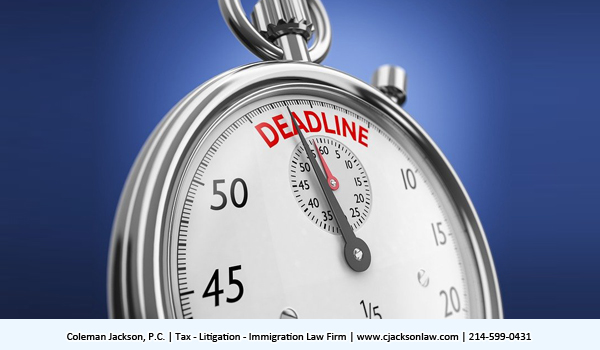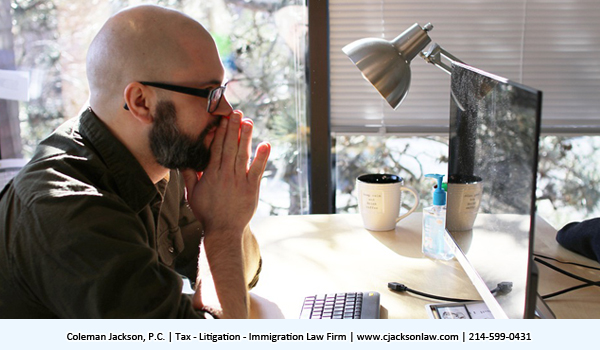By: Coleman Jackson, Attorney & Certified Public Accountant
January 7, 2022
The Law: Treasury Regulation Section 1.6041(a):
The federal income tax regulations require that anyone engaged in a trade or business must report compensation paid on Form 1096, Annual Summary and Transmittal of U.S. Information Returns and Form 1099 for non-employee compensation over $ 600 and on Form W-2 for employee compensation. Form 1099 has been divided into a series of forms over the years. The main ones are Form 1099-Misc which is used for reporting all kinds of payments to third parties and Form 1099-NEC which is used to report compensation paid to non-employees. See Internal Revenue Code Section 6041.
The Deadline for Information Returns and Where: Internal Revenue Code Section 6071:
The deadline for sending employees Form W-2 and filing it with the Social Security Administration is January 31, 2022 for compensation paid in 2021. The deadline for sending non-employees Form 1099-NEC and filing it with the Internal Revenue Service is January 31, 2022 for compensation for services incurred in 2021. Since 2020 compensation of $600 or more paid to non-employees, including attorneys are to be reported on Form 1099-NEC; except for non-employee payments made to corporations. Payments to corporations of attorneys are to be reported on Form 1099-MISC. For non-employee payments made during the course of conducting a trade or business, the deadline for filing Form 1099-MISC is also January 31, 2022. January 31, 2022 is right around the corner; certain extensions are available if requested prior to January 31, 2022.

The Potential Legal Exposure to Employers and Other Payors of Compensation for Services:
An employer or payor of compensation for services who fails to supply accurate information forms, such as, Form W-2 to employees and Forms 1099-NEC to non-employees or Form 1099-Misc to non-employees can be assessed a penalty under Internal Revenue Code Section 6721 for the following violations of U.S. tax law:
- Failure to timely provide a correct Form W-2 to an employee;
- Failure to timely file a correct Form W-2 and related Form W-3 and Form 1096 to the Social Security Administration;
- Failure to timely provide a correct Form 1099-NEC to a non-employee;
- Failure to timely file a correct Form 1099-NEC with the Internal Revenue Service;
- Failure to timely provide a correct Form 1099-Misc to a payee when required;
- Failure to timely file a correct Form 1099-Misc with the Internal Revenue Service; and
- Note: the key point here is the timeliness of providing the proper form to the payee and timely filing the correct information to the proper governmental agencies. For example, the employer does not file Form W-2 with the Internal Revenue Service. Employers and other payors can incur penalties for failing report correct Social Security Numbers or valid ITINs or filing incomplete forms or illegible documents with the government. Employers must ensure employees accurately complete Form I-9 at the time of their hire. Moreover, all payors of compensation to non-employees must verify with the IRS that the tax identification numbers received by workers are properly issued to them. Otherwise, payors of compensation can be subjected to substantial penalties.
Table of Potential Penalties for Untimely or Inaccurate Information Returns:
Internal Revenue Code Section 6721 and the implementation regulations permits the Internal Revenue Service to exercise discretion when charging penalties for failing to comply with U.S. tax law pertaining to information returns. The Internal Revenue Service routinely charge separate penalties for failing to file a correct information return on time and failure to provide correct payee statements on time. So, keep in mind when reviewing the penalty table below that there could be doubling of penalties: one for untimely or failure to file the return with the appropriate governmental agency and two for untimely or failure to provide correct statements to employees or non-employee payees. The following penalties in time can be very substantial and the maximum penalty allowed under the law for negligent violations differ depending on the size of the employer. Intentional violators of these information return laws are subject to a wide range of civil penalties under U.S. tax law, criminal sanctions are also a real possibility for tax fraud. See Internal Revenue Code Section 7204, Tax Crimes, Other Offenses and Forfeitures. Moreover, whenever a taxpayer violates tax laws with intent, willfully or with reckless abandonment they expose themselves and their organizations to legal exposures under other laws pertaining to defrauding the U.S. government. In this blog we will limit our analysis and discussion to civil actions. Interested readers should follow our blog site where we routinely write about taxation, government contracts, contract litigation and immigration law matters; which are, areas of law that we practice at Coleman Jackson, P.C.
Potential Civil Charges for Each Information Return or Payee Statement:
| Tax Year | Up to 30 Days Late | 31 Days Late Through August 1 | After August 1 or Not Filed | Intentional Disregard |
| 2023 | $50 | $110 | $290 | $580 |
| 2022 | $50 | $110 | $280 | $570 |
| 2021 | $50 | $110 | $280 | $560 |
| 2020 | $50 | $110 | $270 | $550 |
| 2019 | $50 | $100 | $270 | $540 |
| 2018 | $50 | $100 | $260 | $530 |
| 2017 | $50 | $100 | $260 | $520 |
| 2016 | $50 | $100 | $260 | $520 |
| 2015 – 2011 | $30 | $60 | $100 | $250 |
I should point out here that although we label the following table in this blog using the term, ‘potential charges’; there is nothing uncertain about these penalty assessments. I do not want you to think that there is some doubt as whether the IRS will enforce the law against violators of the information return reporting laws. These penalties are routinely assessed practically automatically when an IRS agent or examiner audits the taxpayer or the IRS otherwise discovers the problem through informants, disgruntled workers, payees, conflicting information in Form 941, Form 940 and Form 1096, incongruent tax positions taken by the taxpayer, such as 1099A positions or otherwise. In recent years, the IRS Civil and Criminal Divisions seemed to have focused on payroll tax compliance issues. Penalties for failure to timely provide and file information returns are subject to interest just like other penalties under other provisions of the Internal Revenue Code. Criminal provisions in U.S. tax law also exposes violators to potential prosecution.
What Can an Employer Do if Potential Compliance Issues Lurk in the Dark at their Establishments?
Establishments engaged in a trade or business should first of all consider reviewing their 2021 expenses prior to the January 31, 2022 information return filing deadline and make sure that they timely provide employees and non-employees correct statements. Moreover, they should consider filing the correct reports with the correct governmental agency.
In the event an establishment engaged in a trade or business conducts a review of its expenses and determines that they have filed incorrect information reports in the past, they should consider providing corrected statements to their workers or other non-employee payees. This is especially true if they timely files the corrected forms with the appropriate governmental officials. Information returns, if timely corrected may not be subjected to these penalties. There is however a very short window to amend and file corrected information reports. These information reports must be corrected within approximately six months of their respective due date(s).
Now, in the event the returns cannot be corrected by amendment; taxpayers who can show that the information return violations were due to reasonable cause or that their failure to comply with federal tax laws were not due to any fault of their own or that the violations of law were due to causes beyond their powers or controls could potentially successfully get the penalties abated in part or in total. An abatement of penalty request is simply a way the taxpayer can seek forgiveness. The request is based in fundamental fairness and justice and requires good faith and a genuine basis in fact and law. The traditional penalty abatement procedures and rules apply to abatement of penalty request associated with violations of the federal information return tax laws. The decision to ask for an abatement of penalties should not be filed lightly since frivolous refund requests applies to abatement requests. Frivolous or groundless requests are subject to a 20% penalty under U.S. tax law. These requests need to be based in law with the marshalling of documentary evidence, witness testimony and other credible substantiating evidence.
This law blog is written by the Taxation | Litigation | Immigration Law Firm of Coleman Jackson, P.C. for educational purposes; it does not create an attorney-client relationship between this law firm and its reader. You should consult with legal counsel in your geographical area with respect to any legal issues impacting you, your family or business.
Coleman Jackson, P.C. | Taxation, Litigation, Immigration Law Firm | English (214) 599-0431 | Spanish (214) 599-0432 | Portuguese (214) 272-3100




